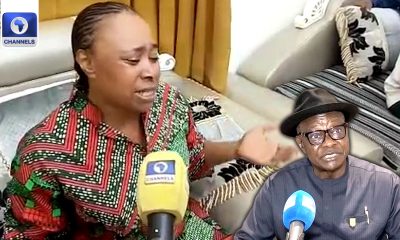Business
Sell excess dollars in 24 hours, CBN orders banks

Sell excess dollars in 24 hours, CBN orders banks
The Central Bank of Nigeria, CBN, has ordered Deposit Money Banks to sell their surplus dollar stock by February 1, 2024, as part of new measures to stabilize the country’s fluctuating currency rate.
The CBN, which made the announcement in a fresh circular issued on Wednesday, also urged lenders not to hold extra foreign currency for profit.
According to officials, the central bank believes that some commercial banks have long-term foreign exchange positions to profit from the erratic swings of exchange prices.
The new circular introduces a set of guidelines aimed at reducing the risks associated with these practices.
In the circular titled, “Harmonisation of Reporting Requirements on Foreign Currency Exposures of Banks”, the CBN raised concerns over the growing trend of banks holding large foreign currency positions.
The latest circular came barely 48 hours after the CBN released a circular, warning banks and FX dealers against reporting false exchange rates, among others.
The new development also came on the heels of the adjustment of the methodology used for the calculation of the nation’s official exchange rate by the FMDQ Exchange.
The review has pushed the Nigerian Autonomous Foreign Exchange Market rate (official exchange rate) from approximately N900/dollar to N1,480/dollar. The naira closed at 1,450/dollar at the parallel market on Tuesday.
The move which is aimed at unifying the official and parallel market exchange rates has been hailed by economists and other stakeholders.
READ ALSO:
- Dollar scarcity: BDC operators shut down operation in Abuja
- Four kidnappers arrested after collecting ransom in Edo
- Lagos carjacker Emmanuel Iwuno bags death sentence
- Liverpool thrash sorry Chelsea to stretch Premier League lead
They however challenged the CBN to clear FX backlogs estimated at over $5bn and also fund FX demands at the official market. This, they said, would forestall a situation whereby the parallel market rate would move away from the official rate again.
Apparently as part of the moves to fund FX request at the official window, the CBN in its latest circular released on Wednesday accused banks of holding excess foreign exchange positions.
As a result, the central bank gave lenders until February 1, 2024 (today) to sell off excess dollar positions.
The circulated, dated January 31, 2024, was signed by the Director, Trade and Exchange, CBN, Dr. Hassan Mahmud, and representative of the Director, Banking Supervision, CBN, Mrs. Rita Sike.
The circular read in part, “The Central Bank of Nigeria has noted with concern the growth in foreign currency exposures of banks through their Net Open Position (NOP). This has created an incentive for banks to hold excess long foreign currency positions, which exposes banks to foreign exchange and other risks.”
To address these issues, the CBN in the circular issued prudential requirements that banks must follow. A key focus of these requirements is the management of the Net Open Position (NOP).
The NOP measures the difference between a bank’s foreign currency assets (what it owns in foreign currencies) and its foreign currency liabilities (what it owes in foreign currencies).
The circular mandates that the NOP must not exceed 20 per cent short or 0 per cent long of the bank’s shareholders’ funds.
This calculation, the apex bank said, must be done using the Gross Aggregate Method, which provides a comprehensive view of the bank’s foreign currency exposure.
Furthermore, banks with current NOPs exceeding these limits are required to adjust their positions to comply with the new regulations latest by February 1, 2024.
Additionally, banks must calculate their daily and monthly NOP and Foreign Currency Trading Position (FCT) using specific templates provided by the CBN.
The CBN also directed banks to maintain adequate stocks of high-quality liquid foreign assets, such as cash and government securities, in each significant currency.
According to the circular, all banks are required to adopt adequate treasury and risk management systems to provide oversight of all foreign exchange exposures and ensure accurate reporting on a timely basis.
Banks are expected to bring all their exposures within the set limits immediately and ensure that all returns submitted to the CBN to provide an accurate reflection of their balance sheets.”
Finally, the CBN warned banks that non-compliance with the NOP limit would result in immediate sanction and suspension from the foreign exchange market.
READ ALSO:
- What must be done to make naira rise again – Reno Omokri
- Over 30 feared dead as tanker explodes in Imo forest
- OAUTHC sacks 2,000 health workers over illegal recruitment
In the half of 2023, First Bank, UBA, Zenith, Access, and GTB reported a combined N1.38tn in forex revaluation gains.
The apex bank at the time issued a directive instructing commercial banks to resist using their foreign exchange revaluation gains for dividends and operational expenditures. It noted that “Banks that exceed the NOP prudential limits due to the FX revaluation shall be granted forbearance for the breach upon application.’’
A top bank executive, who spoke on condition of anonymity, said the new circular would force banks to sell off excess dollar liquidity exceeding $5bn.
The top banker said, “Just as some Nigerians prefer to keep their money in dollars because naira is not a good store of value, banks also hold excess dollar liquidity to make gains. They do their own at institutional level. What the CBN is saying with this new circular is that, you cannot hold excess dollar liquidity again. Any foreign exchange you are holding must be committed to something, a transaction or obligation you can proof. Banks have made a lot of revaluation gains. Some banks, I believe, got approval under the last administration to hold more dollar than the requirement. The idea is that if banks sell all these excess dollars, there will liquidity and the exchange rate will stabilise. Foreign investors will come in.”
Naira trades
Meanwhile, the naira closed at N1,455.59/$ at the official window on Wednesday, according to the FMDQ Securities Exchange. This is a 1.82 per cent appreciation from the N1482.57/$ it closed trading on Tuesday.
At the parallel market, it lost N61 to trade at N1,511/$. A Bureau De Change operator, Malam Ibrahim, told The PUNCH, “For now, we are selling between N1,511/$ and N1,512/$. Earlier today, the dollar was sold between N1,535/$ and N1,540/$.”
Another operator said he could only sell at N1,510/dollar. However, a source at the market informed our correspondent of a ‘no sales policy’ to be implemented by the BDC union tomorrow.
READ ALSO:
- Senate summons CBN governor over weak naira, inflation
- Zamfara gov launches state security outfit, says no negotiation with bandits
- Mining cave collapses in Bauchi, four women killed
The source said the decision was taken today after serious deliberations on how to reduce the fall of the naira.
“Nobody is coming to market tomorrow. We want to close the market because honestly, the naira is just crashing anyhow. This was caused by some media reports this week that the dollar was now selling for N1,500 even though we were still selling at N1,400. Now everybody is blaming black market operators and that’s why we decided that the market will remain closed tomorrow,” the source said.
“We will resume next tomorrow, and the rate should be less than N1,400/$,” the source added.
On the cryptocurrency peer-to-peer market, the naira was trading for N1,495.1/$ on Binance’s P2P platform as of the time of filing this report.
The naira is recording its worst week on the official market following the move by FMDQ Securities Exchange to revise the methodology used to set the exchange rate. According to a market notice, this new calculation will attempt to narrow the gap between the official and parallel rates of the naira.
It said, “This revision aims to address recent fluctuations and challenges encountered in the Nigerian Foreign Exchange (‘FX’) Market.”
It added, “These revisions are focused on enhancing the accuracy and reliability of the NAFEX and NAFEM rates determination process, with a focus on data availability and integrity involving a rigorous data validation process, including tolerance checks which shall be applied by FMDQ Exchange, subject to internal policies and procedures.”
Sell excess dollars in 24 hours, CBN orders banks
Business
Petrol price rises to N935 in Lagos

Petrol price rises to N935 in Lagos
Petrol marketers across the Lagos metropolis at the weekend raised the pump price of the commodity to between N925 per litre and N935 per litre.
This is in response to the increase in the landing cost of petrol, the stoppage by Dangote Refinery of the sales of the commodity in naira about two weeks ago and the delay in conclusion of negotiation on the naira for crude policy.
Last Monday, the landing cost of the commodity rose to N843.28 per litre from a previous N797 per litre a forthnight ago.
This increase represents an addition of N46 per litre to the landing cost of petrol.
Some filling stations like TotalEnergies sold at N935 per litre; MRS, N925.
ARA is a crucial global oil and biofuel hub known for its physical infrastructure, pricing benchmarks, and significant oil consumption.
It added that seasonal refinery maintenance across Europe and a recent fire at the Falconara refinery in Italy have further restricted supply, adding to market tightness and price volatility.
The Association said the foreign exchange rate remained fairly stable, with minimal fluctuations observed over recent periods.
Therefore, the landing cost of petrol, being fundamentally influenced by these elements, is likely to change several times intra-day.
It advised that savings can be achieved through negotiations, access to foreign exchange, and logistics efficiencies, for example, by eliminating Ship to ship (STS) transfer where possible or receiving larger cargos.
MEMAN explained that the landing cost into Apapa/ASPM Jetty is calculated based on the following assumptions: exchange rate, finance charges at 32 per cent per annum for 30 days; STS and related charges; NIMASA charges at two per cent of local STS; NMDPRA at 0.5 per cent MDGIF; NPA and VAT charges covering towage, berthage/mooring, ship dues, cargo dues, contingency, fire coverage, agency fee; other costs at N2 per litre.
Petrol price rises to N935 in Lagos
Business
Dangote Refinery: MRS, other filling stations increase petrol price
Dangote Refinery: MRS, other filling stations increase petrol price
The price of petrol has surged to N930 per litre in Lagos and N960 in northern states, following the recent suspension of naira payments for crude oil by the Dangote refinery.
MRS filling stations implemented the new pricing structure on March 28, 2025, marking a N70 increase from the previous rate of N860 in Lagos and N80 higher than the former N880 in the North.
Other fuel retailers have also adjusted their prices, with NIPCO reportedly selling at N930 per litre in Magboro, Ogun State, on Saturday.
According to MRS Oil & Gas, trucks will load products from its Lagos depot and distribute them across the country at varying costs.
The company’s latest pricing document confirms that Lagos has the lowest fuel rate, while northern states face the highest prices. However, the company did not specify whether it sourced its supply from the Dangote refinery.
Under the revised price framework, petrol now costs N930 per litre in Lagos, N940 in other South-West states, and N960 in the South-South and South-East regions, including Edo, Abia, Akwa Ibom, Bayelsa, Rivers, Cross River, and Enugu.
READ ALSO:
- Ex-Rivers HoS wife cries for help over husband’s safety
- Fubara reacts as Ex-HOS, Nwaeke accuses him of bombing oil pipelines, Rivers Assembly
- Natasha: Emmanuel Uduaghan threatens to sue Senator Nwaebonyi
In the North, Abuja, Kaduna, Benue, Kogi, Niger, Sokoto, Kebbi, and Nasarawa will pay N950 per litre, while Zamfara, Kano, Jos, Bauchi, Taraba, Adamawa, Borno, Katsina, Jigawa, Gombe, and Yobe will pay N960.
The Free Carrier Agreement (FCA) price, which determines how much marketers pay before reselling fuel, also differs by region. Lagos has the lowest FCA price at N905 per litre, whereas states like Borno, Taraba, Adamawa, and Yobe have FCA prices around N888 per litre.
The recent suspension of the naira-for-crude initiative by the Dangote refinery was attributed to discrepancies in crude oil allocation. Sources indicate that the Nigerian National Petroleum Company Limited (NNPCL) allocated large volumes of crude to foreign creditors to settle outstanding loans, making it difficult to sustain local transactions in naira.
As a result, independent fuel importers have taken advantage of the situation, increasing depot prices. Industry analysts warn that the rising petrol costs could drive up transportation fares and the prices of goods and services.
Experts suggest that prices may stabilize once the Dangote refinery secures a reliable crude oil supply from NNPCL and resumes selling in naira. Until then, consumers across the country will have to contend with higher fuel costs.
Dangote Refinery: MRS, other filling stations increase petrol price
(PUNCH)
Auto
Lanre Shittu Motors to endow Automobile Department of Lagos Technical College

Lanre Shittu Motors to endow Automobile Department of Lagos Technical College
Lanre Shittu Motors has announced a novel idea that will boost automobile studies in a Lagos technical college.
Specifically, it has pledged to adopt the Automobiles Department of the Government Technical College, Aso-Soba in the Festac area of Lagos.
This is intended to raise academic and practical programme standards of the school.
The company said this would involve adequate funding, in-school training and intensive industrial training (IT) with welfare package to encourage more young people to pursue academic career in automotive engineering.
Business Support/Admin Manager of LSM, Mr Babatunde Adenuga, disclosed this in Lagos, in an interview with journalists.
Adenuga represented the LSM Managing Director, Mr Taiwo Shittu, at the just concluded Engineering Week of the college sponsored by the auto company, where he unveiled the plan to the staff and students at the event’s grand finale.
Aside from the needed financial support to make the auto department functional and standard, he said LSM would provide the tools, overall wears/workshop uniform, among others, as part of the welfare package for the students.
He said it would be a win-win situation for the school and the company.
Adenuga said, “The school will benefit immensely from the LSM package for the department as we take the financial trouble of running the department away from them.
“Students from the department can come for their internship at LSM workshops, and getting jobs after school won’t be difficult.
“For us, it will be a seamless arrangement in getting suitable personnel familiar with our training and business orientation.”
He also said the LSM had been absorbing students from the school and others for their industrial training (IT), providing them with useful hands-on training and monthly stipend to keep them going.
The LSM MD, Taiwo Shittu, commenting on the support, said, “We’ll be part of the progress of the school. We want to own a department in the technical college, the automobile department of studies that will enable us to fund the place; take care of the welfare of students, providing the tools, overall uniform and other facilities.”
“At LSM, we see training the youths as part of our Corporate Social Responsibility. Every year, we take in youths into our facility and train them; even while in training, we give them stipends.”
The highpoint of the LSM-sponsored Government Technical College event was the presentation of prizes to outstanding students in the various competitions held for the Engineering Week.
Three of the students whose projects stood out such as locally produced water pumping machine and water heater went home with impressive cash awards.
Principal of the college, Mr Folarin Sunkanmi, expressed appreciation to LSM for the interest in the school, starting with giving the students the opportunity for industrial training and offering them monthly stipend.
The principal commended the LSM efforts of sponsoring the engineering week’s activities, whose theme was given as ‘Engineering for Sustainable Development (Innovators of tomorrow)’
He urged other companies to emulate the LSM example in order to boost the employability chances of products of the technical colleges and engineering departments of higher institutions in the country.
-

 Uncategorized2 days ago
Uncategorized2 days agoBreaking: Moon sighted in Saudi, UAE, others, Eid-Fitr holds Sunday
-

 metro2 days ago
metro2 days agoRamadan ends in Nigeria, Sultan announces March 30 as Eid-el-Fitr
-

 metro2 days ago
metro2 days agoFubara reacts as Ex-HOS, Nwaeke accuses him of bombing oil pipelines, Rivers Assembly
-

 metro2 days ago
metro2 days agoEmbrace environmental sanitation during Eid-Fitr, LAGESC boss tells Lagosians
-

 Opinion2 days ago
Opinion2 days agoBarbaric mass burning of innocents in Edo, by Farooq Kperogi
-

 metro2 days ago
metro2 days agoEx-Rivers HoS wife cries for help over husband’s safety
-

 metro2 days ago
metro2 days agoNatasha: Emmanuel Uduaghan threatens to sue Senator Nwaebonyi
-

 Auto2 days ago
Auto2 days agoLanre Shittu Motors to endow Automobile Department of Lagos Technical College







